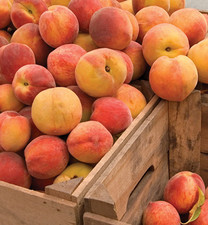No. 12: Bacteria that extends the shelf life of fruit

A peach can only travel so far. After a few days in shipping, it begins to spoil, making it tough for people in faraway lands to enjoy the iconic Georgia fruit.
But that could soon change, thanks to a breakthrough at Georgia State University. Biologists Sid Crow and George Pierce have come up with a way to delay ripening in certain fruits, slowing the growth of mold and doubling their shelf life.
Their discovery hinges on a bacterium (Rhodococcus rhodochrous), which produces enzymes that diminish the effects of the fruit's release of ethylene gas, thus slowing the ripening process.
In the researchers' GSU lab, the bacteria is fermented in industrial-grade stainless steel tanks, thriving on a diet of sugars, proteins and oxygen. The crucial development-ripening enzymes are then harvested and formulated as a spray, which can be applied to the interior of shipping boxes or containers.
Since the product removes the need for refrigeration, it could offer huge savings on energy … and that's just the beginning.
According to the U.S. Department of Agriculture, about 40 percent of fruits and veggies are thrown away because of spoilage or damage in transport — a tremendous waste of resources, from water and land to shipping costs and human power.
So far, the discovery has yielded six patents for Georgia State and is capturing the attention of industry. Through their newly launched company, TerraCopia Group, the scientists are working to bring the product to market.
Crow and Pierce believe their find will bring enormous cost savings to farmers and food distributors, huge benefits to the environment and cheaper, tastier nutrition for working families.
(And maybe a chance for the famous Georgia peach to see more of the world...)
